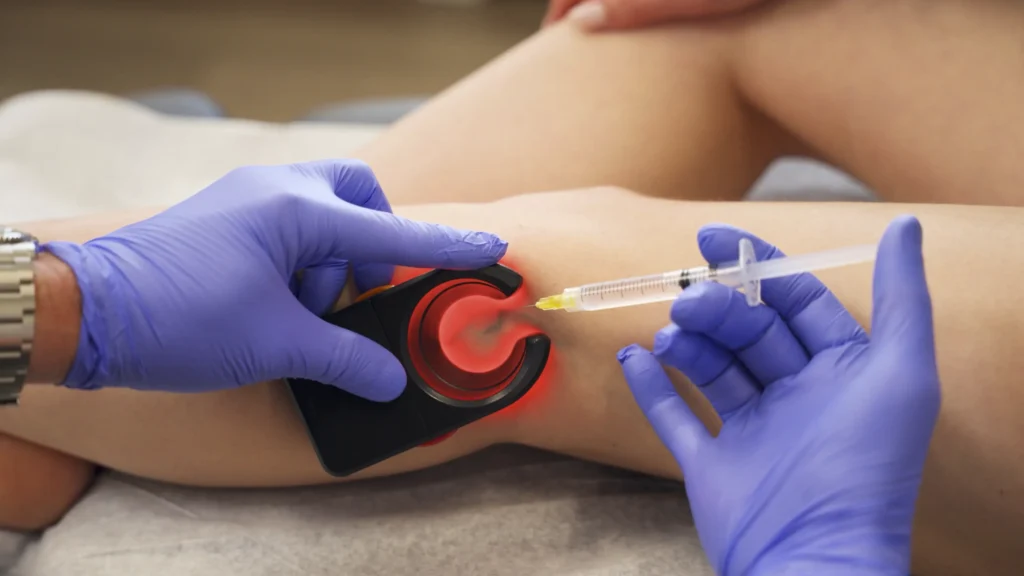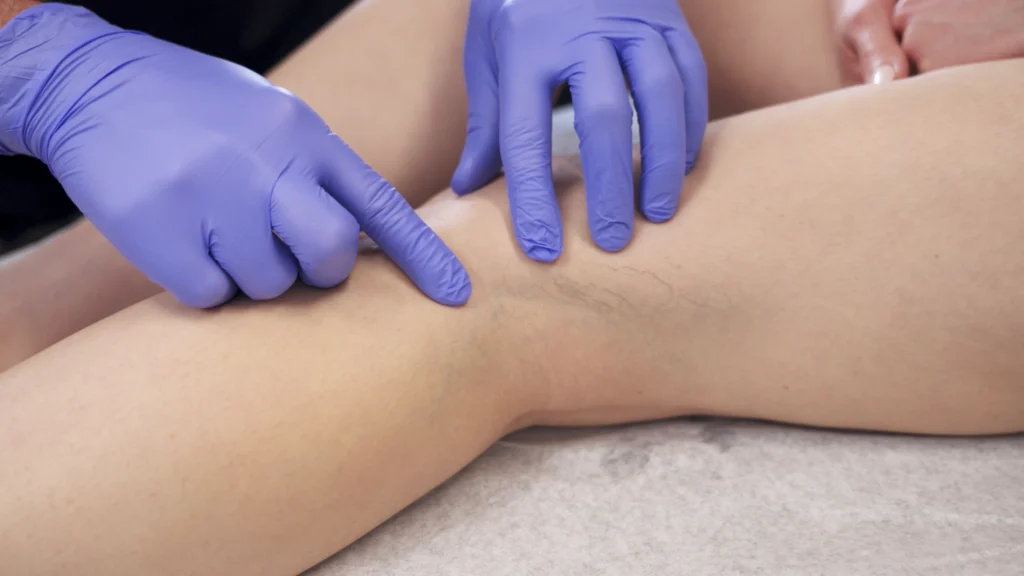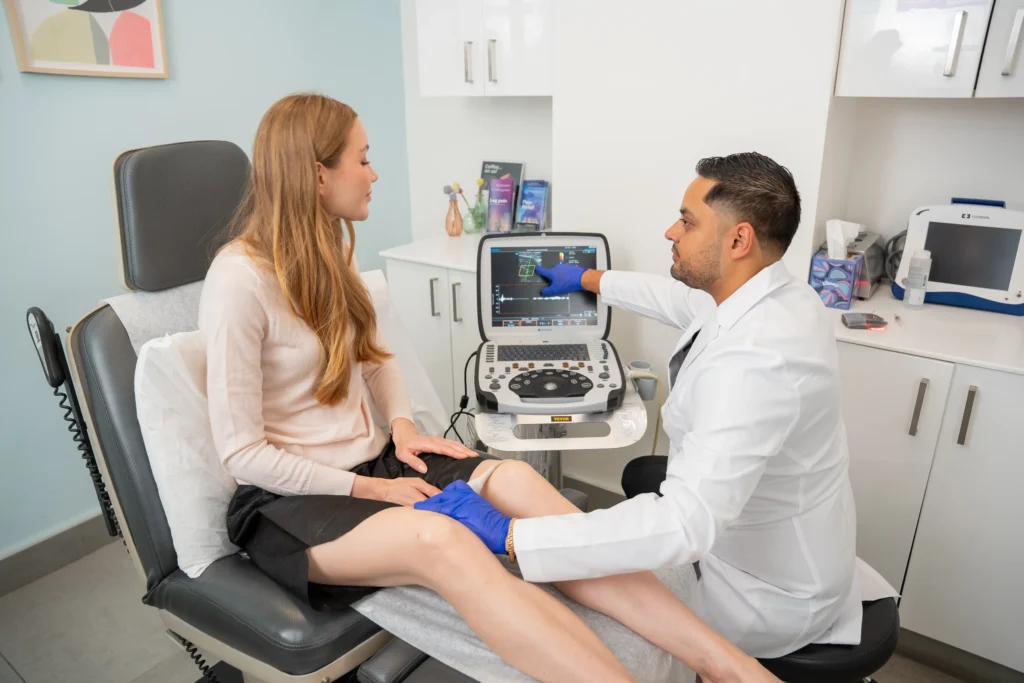Managing Menopause Symptoms and Vein Health
Menopause is a natural phase in a woman’s life, typically occurring between the ages of 45 and 55 and marks the end of menstrual cycles. This transition, driven by a decline in hormone production, brings a range of symptoms such as hot flashes, night sweats, and mood swings. While these symptoms are well-known, less attention is often given to the impact of menopause on vein health. Hormonal changes during menopause can contribute to the development of varicose and spider veins, adding another layer of concern for women at this stage of life.
Understanding the connection between menopause and vein health is crucial for managing overall well-being. This article explores how menopause affects vein health and provides strategies for managing both menopause symptoms and vein-related issues.
Menopause and Vein Health
The hormonal fluctuations that characterize menopause, particularly the decrease in estrogen, play a significant role in vein health. Estrogen helps maintain the elasticity of vein walls, and as its levels drop, veins can become weaker and more prone to issues like varicose veins and spider veins. Varicose veins are enlarged, twisted veins that often appear on the legs, while spider veins are smaller, red or blue veins visible just under the skin.
These vein conditions can cause discomfort, including aching, swelling, and a heavy sensation in the legs. In more severe cases, varicose veins can lead to complications like skin changes, ulcers, and blood clots. Factors like age, family history, obesity, and prolonged standing or sitting further increase the risk of developing vein problems during menopause.
Are you interested in getting more information about your condition or a treatment?
Fill the form below to start!
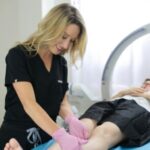
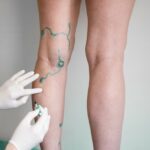
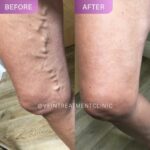
Managing Menopause Symptoms and Vein Health
A comprehensive approach to managing menopause symptoms and promoting vein health involves addressing both areas simultaneously. Here are some strategies:
Hormone Replacement Therapy (HRT)
Hormone Replacement Therapy (HRT) is often considered to alleviate menopause symptoms by replenishing the body’s hormone levels. HRT can help reduce hot flashes, night sweats, and mood swings, which improves the overall quality of life. There is also some evidence suggesting that HRT might benefit vein health by maintaining the integrity of vein walls.
However, HRT is not suitable for everyone, and its use must be carefully evaluated by a provider due to potential risks, including increased chances of blood clots. Consultation with a doctor is essential to determine if HRT is appropriate based on individual health profiles and risk factors.
Healthy Lifestyle Changes
Adopting a healthy lifestyle can significantly impact both menopause symptoms and vein health. Here are some key changes to consider:
- Exercise: Regular physical activity enhances circulation, which is beneficial for vein health and can also alleviate some menopause symptoms. Activities like walking, swimming, and yoga are particularly effective.
- Maintaining a Healthy Weight: Excess weight puts additional pressure on veins, increasing the risk of varicose veins. A balanced diet rich in fruits, vegetables, lean proteins, and whole grains can help manage weight and provide nutrients that support overall health.
- Eating a Balanced Diet: A diet high in fiber and low in salt can prevent constipation and fluid retention, which can worsen varicose veins. Antioxidant-rich foods like berries, leafy greens, and nuts support vein health by reducing inflammation.
- Wearing Compression Stockings: Compression stockings apply gentle pressure to the legs, improving blood flow and reducing swelling and discomfort associated with varicose veins. They are particularly useful for those who spend long periods sitting or standing.
VeinCenter: Your Partner in Vein Care
At VeinCenter, we understand the unique challenges that menopause can pose to vein health. Our team of board-certified vein doctors specializes in diagnosing and treating vein conditions with minimally invasive techniques, ensuring effective and comfortable care. We use state-of-the-art technology, including duplex ultrasound, to provide precise diagnoses and personalized treatment plans. Our minimally invasive treatments, such as sclerotherapy, endovenous laser therapy (EVLT), and radiofrequency ablation, offer quick recovery times and excellent results.
If lifestyle changes don’t alleviate your symptoms, we offer the following minimally invasive treatments to address the root cause of your vein problems:
- Endovenous Laser Therapy (EVLT): Uses laser energy to seal off varicose veins, improving blood flow and reducing symptoms.
- Radiofrequency Ablation (RFA): Utilizes radiofrequency energy to heat and close off problematic veins, providing relief from discomfort and swelling.
- Sclerotherapy: Involves injecting a solution into spider veins and small varicose veins, causing them to collapse and fade over time.
- VenaSeal: A medical adhesive used to close varicose veins, allowing blood to reroute to healthier veins.
- ClariVein: Combines mechanical and chemical methods to treat varicose veins, offering a quick and effective solution.
- Foam Sclerotherapy: A specialized foam injected into varicose veins to close them and improve circulation.
- Ambulatory Phlebectomy: A minimally invasive surgical technique to remove superficial varicose veins through tiny incisions, promoting better vein function.
With multiple locations across the United States, including New York, New Jersey, Long Island, California, and Washington DC, VeinCenter is conveniently positioned to assist you in managing your vein health during menopause.
Additional Tips for Vein Health
In addition to the strategies mentioned, here are more tips to maintain vein health during menopause:
- Elevating Legs When Resting: Raising your legs above heart level when resting helps improve blood flow and reduce pressure on veins.
- Avoiding Prolonged Sitting or Standing: Regularly changing positions and taking breaks to walk around can prevent blood from pooling in the legs.
- Maintaining a Healthy Sleep Routine: Quality sleep is essential to overall health and improved circulation. Establish a regular sleep schedule and create a restful environment to promote better sleep.
FAQs
Q: How does menopause affect vein health?
A: Menopause involves hormonal changes, particularly a decrease in estrogen, which can weaken vein walls and valves. This weakening increases the likelihood of developing varicose veins and spider veins. Additionally, factors like age and family history can further exacerbate vein issues during menopause.
Q: What are the symptoms of vein problems?
A: Symptoms of vein problems include visible veins (varicose or spider veins), aching or heavy legs, swelling, throbbing, muscle cramping, and itching around the veins. In severe cases, skin changes and ulcers may develop.
Q: Are minimally invasive vein treatments painful?
A: Minimally invasive treatments are fairly comfortable. Most procedures involve only local anesthesia and cause minimal discomfort. Patients typically experience a quick recovery with little to no downtime.
Q: How long does it take to see results from vein treatments?
A: Results vary depending on the treatment and individual. Some patients see improvement immediately after the procedure, while others may take a few weeks to notice changes. Full results from treatments like sclerotherapy and EVLT may take several weeks as the veins gradually fade.
Q: Is there any downtime after vein treatments?
A: Minimally invasive vein treatments generally have minimal downtime. Patients can often return to their normal activities immediately, provided they avoid strenuous workouts and heavy lifting for a few days.
Q: Are these vein treatments covered by insurance?
A: Many vein treatments are covered by insurance, especially if they are deemed medically necessary due to symptoms like pain or swelling. VeinCenter offers free insurance verification to help you determine your coverage and minimize out-of-pocket expenses.
Q: How do I know which treatment is right for me?
A: Consulting with a board-certified vein doctor is the best way to determine the appropriate treatment. During a consultation at VeinCenter, our experts will evaluate your condition, discuss your symptoms, and recommend a personalized treatment plan tailored to your needs.
Taking Charge of Your Health
Managing menopause symptoms and maintaining vein health are both essential for overall well-being. It’s important to take proactive steps and consult healthcare providers to develop a personalized plan that addresses both areas. At VeinCenter, we offer free consultations to discuss your vein health concerns. Our compassionate team is dedicated to providing the highest level of care, ensuring you receive the most effective treatments for your needs. Please schedule a consultation to manage your vein health and improve your symptoms.




